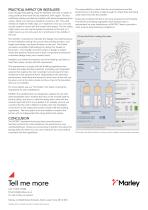 Website:
Marley
Website:
Marley
Group: Marley Ltd
Catalog excerpts

Marley SolarTile® fact sheet Pitch perfect What the MCS012 regulations mean for roof integrated solar panels. THE MICROGENERATION CERTIFICATION SCHEME The Microgeneration Certification Scheme introduced tighter standards for pitched roofing installation of solar panels in 2016. It could be argued, though, that these requirements have always been there because of the need for every installation to comply with UK Building Regulations. Underpinning the scheme is a test procedure called MCS012, which defines a series of tests that can be used to assess the performance of pitched roofing installations for three main criteria: y weather tightness y wind uplift resistance y external spread of flame The testing regime is designed to ensure that solar installers have all the information in their hands to demonstrate that their installations do not impair the weather tightness of the roof, have adequate resistance to wind suction forces and comply with building regulations on the fire performance of roof coverings Systems and system components that are used to install solar panels above an existing pitched roof covering (on-roof systems) do not need to be tested for either weather tightness or external spread of flame, so long as they can demonstrate that the roof covering is not affected by the installation, for example, if the gaps between tiles are increased. By contrast, systems that integrate and replace the roof covering (in-roof systems) are tested for all three aspects. It is important to recognise that MCS012 sets no minimum requirement for wind resistance or fire rating, instead it takes a ‘measure and declare’ approach. It is up to the installer to check that the declared wind resistance is higher than the expected loads, and that limitations imposed by building regulations on the use of systems with lower fire ratings are observed. If the MCS012 standard itself is only a description of a test, where does the requirement to use MCS012 accredited products arise? The answer is found in the installer standards - MIS3001 for solar thermal and MIS3002 for solar PV. MIS 3002 mandates that Solar PV Microgeneration systems must be designed and installed in accordance with the “Guide to the Installation of Photovoltaic Systems”, a joint publication by MCS and ECA. Section 4.3.10 of the Guide mandates the use of MCS012 for pitched roof installations. By contrast, the solar thermal standard - MIS 3001 - does not require the installer to use products that have been tested to MCS012. However for in-roof systems solar installers will find it much easier to demonstrate compliance with the requirements of the standard by choosing an MCS012 accredited system. Both MIS3001 and MIS3002 make explicit the requirement for the installer to meet building regulations. In England and Wales approved document B deals with fire safety. Roofing materials (including roof-integrated solar panels) must have a fire rating, and depending on the fire rating achieved by the product, limitations may be placed on the size of the solar system or its maximum distance from the property boundary. Marley SolarTile® ( a Clearline Fusion product) achieved the highest possible wind resistance during testing for
Open the catalog to page 1
PRACTICAL IMPACT ON INSTALLERS If you thought that getting ready for MCS012 was only a matter of using products that have the accreditation, think again. The test certificate merely provides the installer with declared performance values. There’s no minimum standard, no pass or fail. The wind resistance might be really high, or it might be so low you can only use the system in areas with the lowest wind speed. The fire rating might mean you can use the system anywhere on the roof, or it might mean you can only use it for a small area in the middle of the roof. The responsibility to check...
Open the catalog to page 2All Marley catalogs and technical brochures
-
TIMBER DECKING
11 Pages
-
ASHDOWNE
2 Pages
-
Marley SolarTile® Data sheet
2 Pages
-
Marley SolarTile brochure
7 Pages
-
Decking brochure
11 Pages
-
Eden product brochure
13 Pages
-
Eden fixing
4 Pages
-
Roofing Accessories
33 Pages
-
CLAY PLAIN TILES FIXING GUIDE
108 Pages
-
CLAY PLAIN TILES
76 Pages
-
SHINGLES & SHAKES
28 Pages
-
CLAY INTERLOCKING TILES
44 Pages
-
THE MARLEY ROOF SYSTEM
11 Pages
-
Fibre cement slates
26 Pages
-
Natural Orange Acme double
2 Pages
-
Lincoln Clay Pantiles
9 Pages
-
Roofing Battens
12 Pages
-
Agricultural Brochure
9 Pages
-
Roofing product catalogue
41 Pages
-
Total Roof Systems
16 Pages
-
BS 5534 Grade Battens
4 Pages
-
Roofing Accessories
29 Pages
-
Yard Farm
4 Pages
-
Lincoln
9 Pages
-
YOU, and BS 5534
4 Pages
-
Solo-Fix
1 Pages
-
Clay creasing tiles
2 Pages
-
EQUITONE Brochure
40 Pages
-
Canterbury brochure
12 Pages
-
Roof System
16 Pages
-
Fibre Cement Slates
36 Pages
-
Clay Plain Tiles
72 Pages
-
Ecologic
12 Pages
-
Cedral Fixing guide
56 Pages
-
Vertigo
40 Pages
-
Edgemere interlocking slates
20 Pages
-
Thrutone
2 Pages
-
Universal
8 Pages
-
Dry Fix and Ventilation Systems
44 Pages
-
Solesia PV
8 Pages
-
Edgemere Brochure
16 Pages
-
Clay Plain Tiles
28 Pages
-
Bluclad 20Brochure
4 Pages
-
Cedral Weatherboard and Operal
20 Pages
-
Facades Brochure
133 Pages
-
A5 Guide
31 Pages
-
Fibre Cement Slates Fixing Guide
20 Pages
Archived catalogs
-
Clay plain tiles
72 Pages
-
Fibre Cement Slates
32 Pages
-
equitone brochure
20 Pages


































































